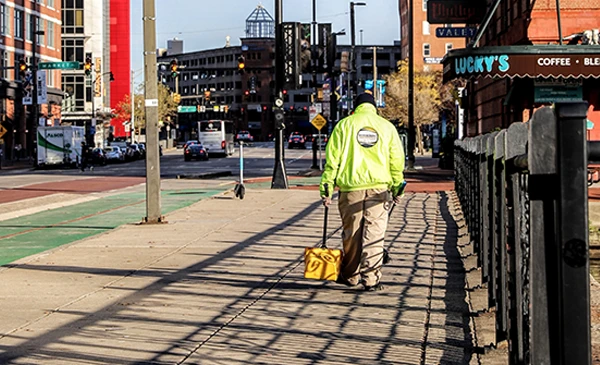Se habla español.
Interpreters available for other languages.
410-706-2781
The ROAR Center is a recognized Center at the University of Maryland, Baltimore

Published in The Daily Record, March 10, 2023
When we are children, many of us are taught that if something bad happens to us, we should call the police. That lesson often continues into adulthood. If we hear a neighbor was robbed, our first thought is, “Did they call the police?” If we hear gunfire, an experience all too common for many living in Baltimore City, Prince George’s County, and communities throughout the state, we think, “I hope someone called the police.”
Despite the lessons many of us have learned, calling the police is not a viable or desirable choice for many members of our community. Although there are many reasons why, key among them is that calling the police does not make the person who was harmed whole.
Someone may be arrested, eventually, or even go to jail. But what about the medical bills to treat the victims’ injuries? What about therapy to overcome the fear and trauma that results? What about lost wages from time off work? What if a loved one is killed, and the family members must pay for a funeral for their 17-year-old child? What about that child’s parents, younger siblings, aunts and uncles, and grandparents? How will they pay for the critical counseling services they deserve and may need to grieve and heal?
Every state has a victims’ compensation law designed to cover these exact expenses. Maryland’s program is called the Criminal Injuries Compensation Board (CICB), and, like its counterparts across the country, it has specific eligibility requirements and criteria an applicant must meet to be reimbursed for certain expenses associated with being a crime victim. We work with and have heard from hundreds of crime victims about how these existing requirements create insurmountable barriers to receiving these critical funds.
One of the requirements is that the victim must apply within three years of being victimized. We have heard from many mothers who have lost their children to homicide that those first three years are an arduous, nearly impossible journey, where simply getting out of bed each morning while crushed by the overwhelming burden of grief and loss of hope is a constant uphill challenge.
The idea that someone would even know about this fund and be able to navigate a complex obstacle course of administrative hoops and paperwork to receive reimbursement is beyond comprehension.
Another requirement is that the victim must report to the police within 48 hours of the victimization. Many recently publicized events have taught white America that many Black, brown, and otherwise marginalized residents do not feel safe calling the police. That means that those who are statistically facing the highest rates of victimization are not eligible for compensation unless they are willing to do the very thing that feels unsafe to do — call the police.
Two other requirements are that the victim must cooperate with the police and be determined – by the police – to not engage in any activities that may have contributed to their victimization.
When meeting with a community group of Black men and women from Baltimore City who themselves have experienced serious violent victimization but were never supported with these benefits, and we explained these requirements, they almost uniformly responded with, “Well, that’s a setup.” “So Black folks will never get this money because we can’t trust the police to protect us?” “We know the police see us all as criminals, so we won’t get it.”
In our experience, serving victims of all types of crime, these reactions are tragically accurate. Gunshot survivors are almost always denied CICB benefits, even if they undertake the task of collecting all the correct documents, waiting for months, responding to requests for more documents, and then waiting again.
We have heard from victims who have waited over two years and are still waiting to be reimbursed – even when they did everything “right” by the dictates of CICB. Victims who have a prior arrest or conviction record also face frequently insurmountable hurdles in being identified as eligible – i.e., worthy of support, even if their prior touches with the system have nothing to do with their current harm.
We have heard from our political leaders that public safety is of utmost priority. Providing support to victims is essential to public safety and crime prevention, not just because it is the “right” thing to do, but because when crime victims are supported in their hardest moments and are not forced to struggle financially, they can heal.
This is vital not only to delivering the compassion and dignity they deserve, but also to greatly reducing the risk of their future subsequent victimization or perpetration of harm.
The CICB must be reformed, and indeed transformed, to eliminate these barriers. It must be sufficiently funded to attend to not only some but all victims’ needs. The return on this investment for our communities is high. Simply put, we must tear down artificial bureaucratic walls and support survivors of violence so they — and their communities — may begin to heal.
Lydia Watts is the Executive Director of the Rebuild, Overcome, and Rise (ROAR) Center of the University of Maryland, Baltimore.